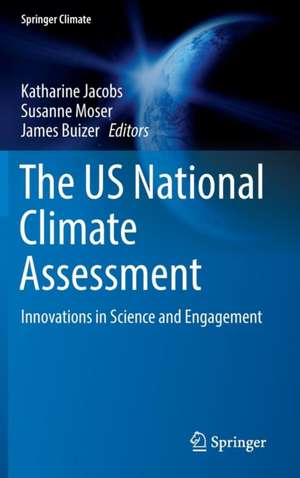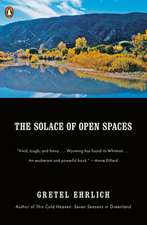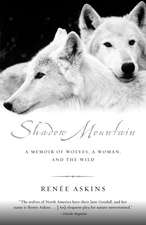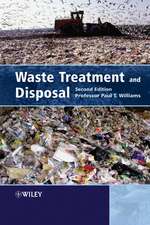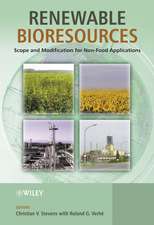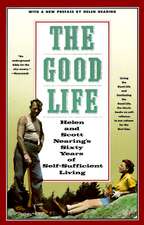The US National Climate Assessment: Innovations in Science and Engagement: Springer Climate
Editat de Katharine Jacobs, Susanne Moser, James Buizeren Limba Engleză Hardback – 18 aug 2016
As the book describes, a key contribution of the NCA3 approach is a far more deliberate interdisciplinary process, as well as an engagement strategy that brought hundreds of public and private sector stakeholders into the assessment community. Among its most important conceptual contributions was an explicit focus on building the infrastructure to conduct better assessments over time and an experimental approach to analysis of the impacts of climate on cross-sectoral systems and inter-locking and cascading effects across sectors.
Readers may explore innovations such as the development of regional climatologies and projections for every region of the US, as well as the development of the Global Change Information System. The book also highlights the need for decision-makers to be part of the assessment process, in order for assessment findings to be truly useful from a decision-maker's perspective. Many lessons have been learned by the NCA3 authors that can be useful in future assessments and adaptation processes, both within the US and internationally. This book passes on such lessons and includes an evaluation of the role of state climate assessments in ongoing national assessment processes.
| Toate formatele și edițiile | Preț | Express |
|---|---|---|
| Paperback (1) | 636.12 lei 6-8 săpt. | |
| Springer International Publishing – 12 iun 2018 | 636.12 lei 6-8 săpt. | |
| Hardback (1) | 642.18 lei 6-8 săpt. | |
| Springer International Publishing – 18 aug 2016 | 642.18 lei 6-8 săpt. |
Din seria Springer Climate
- 18%
 Preț: 1014.45 lei
Preț: 1014.45 lei - 15%
 Preț: 644.95 lei
Preț: 644.95 lei - 20%
 Preț: 753.10 lei
Preț: 753.10 lei - 18%
 Preț: 730.79 lei
Preț: 730.79 lei - 20%
 Preț: 478.86 lei
Preț: 478.86 lei - 17%
 Preț: 362.53 lei
Preț: 362.53 lei - 15%
 Preț: 646.62 lei
Preț: 646.62 lei - 18%
 Preț: 910.26 lei
Preț: 910.26 lei - 18%
 Preț: 1009.70 lei
Preț: 1009.70 lei - 18%
 Preț: 781.94 lei
Preț: 781.94 lei - 18%
 Preț: 1128.57 lei
Preț: 1128.57 lei - 18%
 Preț: 960.13 lei
Preț: 960.13 lei - 20%
 Preț: 513.20 lei
Preț: 513.20 lei - 18%
 Preț: 894.79 lei
Preț: 894.79 lei - 15%
 Preț: 596.87 lei
Preț: 596.87 lei - 15%
 Preț: 645.28 lei
Preț: 645.28 lei - 18%
 Preț: 893.84 lei
Preț: 893.84 lei - 18%
 Preț: 1113.39 lei
Preț: 1113.39 lei -
 Preț: 352.80 lei
Preț: 352.80 lei - 15%
 Preț: 638.76 lei
Preț: 638.76 lei - 18%
 Preț: 1001.19 lei
Preț: 1001.19 lei - 15%
 Preț: 639.90 lei
Preț: 639.90 lei - 18%
 Preț: 953.52 lei
Preț: 953.52 lei - 15%
 Preț: 643.34 lei
Preț: 643.34 lei - 15%
 Preț: 656.25 lei
Preț: 656.25 lei -
 Preț: 416.16 lei
Preț: 416.16 lei - 15%
 Preț: 644.95 lei
Preț: 644.95 lei - 15%
 Preț: 690.11 lei
Preț: 690.11 lei - 15%
 Preț: 465.15 lei
Preț: 465.15 lei -
 Preț: 357.43 lei
Preț: 357.43 lei - 18%
 Preț: 1121.13 lei
Preț: 1121.13 lei - 18%
 Preț: 1114.34 lei
Preț: 1114.34 lei - 15%
 Preț: 696.82 lei
Preț: 696.82 lei - 18%
 Preț: 958.38 lei
Preț: 958.38 lei - 15%
 Preț: 697.15 lei
Preț: 697.15 lei
Preț: 642.18 lei
Preț vechi: 755.51 lei
-15% Nou
Puncte Express: 963
Preț estimativ în valută:
122.90€ • 126.79$ • 104.01£
122.90€ • 126.79$ • 104.01£
Carte tipărită la comandă
Livrare economică 05-19 martie
Preluare comenzi: 021 569.72.76
Specificații
ISBN-13: 9783319418018
ISBN-10: 3319418017
Pagini: 190
Ilustrații: VI, 201 p.
Dimensiuni: 155 x 235 x 13 mm
Greutate: 0.47 kg
Ediția:1st ed. 2016
Editura: Springer International Publishing
Colecția Springer
Seria Springer Climate
Locul publicării:Cham, Switzerland
ISBN-10: 3319418017
Pagini: 190
Ilustrații: VI, 201 p.
Dimensiuni: 155 x 235 x 13 mm
Greutate: 0.47 kg
Ediția:1st ed. 2016
Editura: Springer International Publishing
Colecția Springer
Seria Springer Climate
Locul publicării:Cham, Switzerland
Cuprins
The Third US National Climate Assessment: Innovations in Science and Engagement.- Building Community, Credibility and Knowledge: the Third US National Climate Assessment.- Building a Sustained Climate Assessment Process.- Engagement in the Third U.S. National Climate Assessment: Commitment, Capacity, and Communication for Impact.- Innovations in Science and Scenarios for Assessment.- Innovations in Information Management and Access for Assessments.- Building an Integrated U.S. National Climate Indicators System.- Climate Change Impacts on Ecosystems and Ecosystem Services in the United States: Process and Prospects for Sustained Assessment.- Engagement with Indigenous Peoples and Honoring Traditional Knowledge Systems.- The Third National Climate Assessment’s Coastal Chapter: the Making of an Integrated Assessment.- Assessing Decision Support Systems and Levels of Confidence to Narrow the Climate Information “Usability Gap”.- Innovations in Assessment and Adaptation: Building on theUS National Climate Assessment.- U.S. National Climate Assessment Gaps and Research Needs: Overview, the Economy and the International Context.- Aspirations and Common Tensions: Larger Lessons from the Third US National Climate Assessment.
Textul de pe ultima copertă
This book offers valuable climate policy and climate assessment lessons, depicting what it takes to build a sustained climate assessment process. It explores the third U.S. National Climate Assessment (NCA3) report as compared with previous US national climate assessments, from both a process and content perspective. The U.S. Global Change Research Program is required by law to produce a National Climate Assessment report every four years, and these reports provide a comprehensive evaluation of climate science as well as observed and projected climate impacts on a variety of sectors.
As the book describes, a key contribution of the NCA3 approach is a far more deliberate interdisciplinary process, as well as an engagement strategy that brought hundreds of public and private sector stakeholders into the assessment community. Among its most important conceptual contributions was an explicit focus on building the infrastructure to conduct better assessments overtime and an experimental approach to analysis of the impacts of climate on cross-sectoral systems and inter-locking and cascading effects across sectors.
Readers may explore innovations such as the development of regional climatologies and projections for every region of the US, as well as the development of the Global Change Information System. The book also highlights the need for decision-makers to be part of the assessment process, in order for assessment findings to be truly useful from a decision-maker's perspective. Many lessons have been learned by the NCA3 authors that can be useful in future assessments and adaptation processes, both within the US and internationally. This book passes on such lessons and includes an evaluation of the role of state climate assessments in ongoing national assessment processes.
Caracteristici
Provides a comprehensive evaluation of the state of knowledge of climate change for the US Presents an insider-perspective on the processes used to conduct the largest and most comprehensive National Climate Assessment ever produced, written by many of the leaders of the field Contains a wide array of insights that is useful for a wide range of future scientific assessments, ranging from IPCC, to future national and international science assessments, to more focused evaluations of the state of knowledge within specific fields
